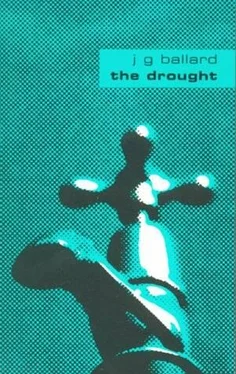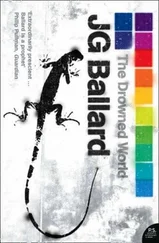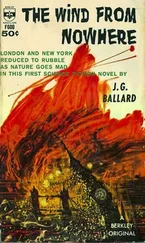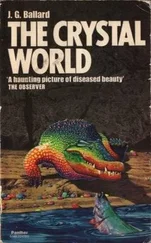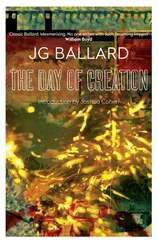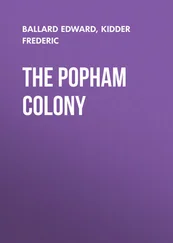Quilter ignored them as they scrambled around his feet for a better view of the fire. A man's hunchbacked figure was silhouetted against the screens. There seemed no point in lighting the fire, and Ransom decided that its significance was ritual, part of some established desert practice. Like so many defunct and forgotten rituals, it was now more frightening in its mystery than when it had served some real purpose.
Miranda watched the children scurry among the curtains. "My infants, doctor, or the few that lived. Tell me you think they're beautiful."
"They are," Ransom assured her hastily. He took one of the children by the arm and felt the huge bony skull. Its eyes were illuminated by a ceaseless ripple of thoughts. "He looks like a genius."
Miranda nodded sagely. "That's very right, doctor, they all are. What's still locked up inside poor old Quilter I've brought out in them."
There was a shout from above. A one-eyed man with a stooped crablike walk, his left arm ending in a stump above the wrist, the other blackened by charcoal, peered down at them. His face and ragged clothes were covered with dust, as if he had been living in the wild for several months. Ransom recognized the driver of the water tanker who had taken him to the zoo. A scar on the right cheek had deepened during the previous years, twisting his face into a caricature of an angry grimace, so that the man was less frightening than pathetic, a scarred wreck of himself.
Addressing Quilter, he said: "The Jonas boy and the woman went off along the river. The lions will get them tonight."
Quilter stared at the floor of the pool. At intervals he reached up and scratched his tonsure. His preoccupied manner suggested that he was struggling with some insoluble conundrum.
"Have they got any water?" Miranda asked.
"Not a drop," Whitman rejoined with a sharp laugh. His twisted face, which Ransom had seen reflected over his shoulder in the store window, gazed down at him with its fierce eye. Whitman wiped his forehead with his stump, and Ransom remembered the mannequins torn to pieces by the dogs. Perhaps this was how the man took his revenge, hating even the residuum of human identity in the blurred features of the mannequins, standing quietly in the piazza like the drained images of the vanished people of the city left behind far into the future. Everything around Ransom now seemed as isolated, the idealized residue of a landscape and human figures whose primitive forbears had long since gone. He wondered what Whitman would do if he knew that Ransom too had once amputated the dead. Neither past nor future could change, only the mirror between them.
Whitman was about to move off when the sounds of a distant voice echoed across the dunes. A confused harangue, addressed to itself as much as to the world at large, it was held together by a mournful dirgelike rhythm.
Whitman scuttled about. "Jonas!" He seemed uncertain whether to advance or flee. "I'll catch him this time!"
Quilter stood up. He placed the swan's cap on his head.
"Quilter," Miranda called after him. "Take the doctor. He can have a word with Lomax, and find out what he's up to."
Quilter remounted his stilts. They climbed out of the pool and set off past the remains of the fire burning itself out, following Whitman across the dunes. Tethered to the stump of a watchtower in one of the hollows were the dogs. The small pack, now on leash, tugged at Whitman's hand. He crept along the low walls, peering over the rough terrain. Twenty yards behind him, towering into the air like an idol in his full regalia, came Quilter, Ransom at his heels. From somewhere ahead of them the low monotonous harangue sounded into the air.
Then, as they mounted one of the dunes, they saw the tall solitary figure of Jonas a hundred yards away, moving slowly among the ruins by the edge of the drained lake. His dark face raised to the sunlight, he walked with the same entranced motion, declaiming at the white bone-like dust that reached across the lake to the horizon. His voice droned on, part prophecy, part lamentation, and twice Ransom caught the word "sea." His arms rose at each crescendo, then fell again as he disappeared from sight.
Obliquely behind him, Whitman scurried along, holding back the straining bodies of the dogs. He hesitated behind the base of a ruined tower, waiting for Jonas to emerge on to the more open stretch of the old lakeside road. He placed the leash in his mouth, and with his one hand began to undo the thong.
"Jonas-"
The call came softly from among the dunes out on the lake. Jonas stopped and looked around, searching for the caller, then saw the grotesque capped figure of Quilter behind him and the dogs jerking away from the hapless Whitman.
As the dogs rushed off in a pack, the tall man came to life. Lowering his head, he raced off, his long legs carrying him away across the rubble. The dogs gained on him, snapping at his heels, and he pulled an old fishing net from around his waist and whipped It across their faces. Suddenly the dogs entangled themselves around the stump of a telegraph pole and came to a halt, barking over each other as they tumbled in the dust.
Ransom watched the thin figure of the preacher disappear along the lakeshore. Whitman cursed his way over to the dogs, kicking at their flanks. Quilter, meanwhile, was gazing unperturbed at the hillocks of rubble.
"Is Jonas still looking for this lost sea?" Ransom asked him.
"He's found it," Quilter said.
"Where?"
Quilter pointed to the lake, at the white chalklike dunes, the myriads of fine bones washed to the surface by the wind speckling in the sunlight.
"This is his sea?" Ransom said as they set off. "Then why doesn't he go out onto it?"
Quilter shrugged. "Lions there," he said, and then strode on ahead.
A hundred yards away, across the stretch of open ground separating the Lomax's swimming pool from the eastern edge of the estate, a small pavilion appeared in a hollow among the dunes, its glass and metal cornices shining brilliantly in the sunlight. It had been constructed from assorted pieces of chromium and enameled metal-the radiator grilles of cars, reflectors of electric heaters, radio cabinets, and so on-fitted together with remarkable ingenuity to form what appeared at a distance to be a bejeweled miniature temple. In the sunlight the gilded edifice gleamed among the dust and sand like a huge Fabergé gem.
Quilter stopped fifty yards from it. "Lomax," he said by way of introduction. "You tell him if he doesn't find water soon he's going to _drown_."
Leaving Ransom with this paradox, he strode away toward the pool.
Ransom set off across the sand. As he approached the pavilion he compared it with the crude hovels he had constructed out of the same materials at the coast, but the even desert light and neutral sand encouraged fancy and imagination while the damp saltdunes had drained it.
He reached the ornamented portico and peered inside. The walls of the small anteroom were decorated with strips of curved chromium. Colored discs of glass taken from car headlamps had been fitted into a grille and formed one continuous wall, through which the sun shone in dozens of images of itself. Another wall was constructed from the grilles of radio sets, the lines of gilded knobs forming astrological patterns.
An inner door opened. A plump, scented figure darted out from the shadows and seized his arm.
"Charles, my dear boy! They said you were coming! How delightful to see you again!"
"Richard…" For a moment Ransom gaped at Lomax. The latter circled around him, goggling over Ransom's ragged clothes with the eyes of a delirious goldfish. Lomax was completely bald, and now resembled a handsome but hairless woman. His skin had become smooth and creamy, untouched by the desert wind and sun. He wore a gray silk suit of extravagant cut, the pleated trousers like a close-fitting skirt or the bifurcated tail of a huge fish, the embroidered jacket fitted with ruffs and rows of pearl buttons. To Ransom he resembled a grotesque pantomime dame, part amiable scoundrel and part transvestite, stranded in the middle of the desert with his pavilion of delights.
Читать дальше
Конец ознакомительного отрывка
Купить книгу
